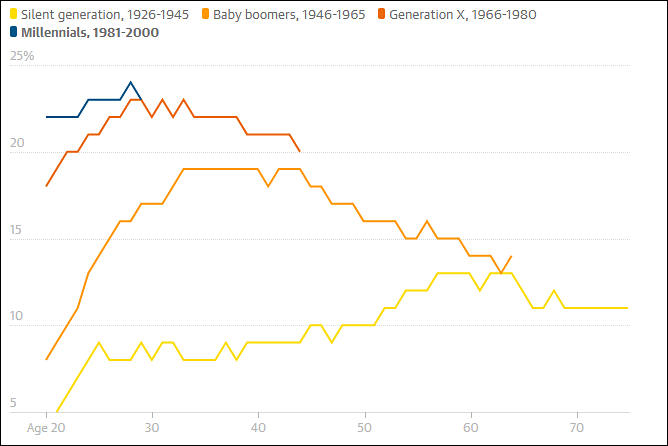
It allows to keep PV going, with more focus towards AI, but keeping be one of the few truly independent places.
-
Millennials are spending three times more of their income on housing than their grandparents yet are often living in worse accommodation, says a study launched by former Conservative minister David Willetts that warns of a “housing catastrophe”.

The generation currently aged 18-36 are typically spending over a third of their post-tax income on rent or about 12% on mortgages, compared with 5%-10% of income spent by their grandparents in the 1960s and 1970s. Despite spending more, young people today are more likely to live in overcrowded and smaller spaces, and face longer journeys to work – commuting for the equivalent of three days a year more than their parents.
A young family today has to save for 19 years on average to afford a typical deposit compared with three years for the previous generation, the report states.
http://www.resolutionfoundation.org/publications/home-affront-housing-across-the-generations/

 s1004.jpg668 x 446 - 34K
s1004.jpg668 x 446 - 34K -
This supports the contention that wages have stagnated over the three or more decades. Prices rise, including real estate, but wages remain flat. That's a recipe for disaster for young people today.
-
This supports the contention that wages have stagnated over the three or more decades.
No such thing as abstract wages exist, it is always different for different classes.
We have big topic https://www.personal-view.com/talks/discussion/6770/the-servant-economy-where-americas-elite-is-sending-the-middle-class-
-
No such thing as abstract wages exist...
True. However, people are able (and do) to move from class to class in free economies.
-
However, people are able (and do) to move from class to class in free economies.
Can you please provide me documented statistics on such movement?
What is probability for child in average proletariat family to become capitalist?
-
@Vitaliy I'm referring to mobility within the mutually exclusive free economies, not from communist nations to capitalist scenarios. The US has many, many examples of people born in poverty only to become successful in the free market economy.
-
I think you did not understand questions, they had been specific.
Show me research link or official statistics documents about amount of proletariat members (or their children) who became capitalists.
I'd love to chat about dreams, but on PV we rely on data.
Howdy, Stranger!
It looks like you're new here. If you want to get involved, click one of these buttons!
Categories
- Topics List23,990
- Blog5,725
- General and News1,353
- Hacks and Patches1,153
- ↳ Top Settings33
- ↳ Beginners256
- ↳ Archives402
- ↳ Hacks News and Development56
- Cameras2,367
- ↳ Panasonic995
- ↳ Canon118
- ↳ Sony156
- ↳ Nikon96
- ↳ Pentax and Samsung70
- ↳ Olympus and Fujifilm101
- ↳ Compacts and Camcorders300
- ↳ Smartphones for video97
- ↳ Pro Video Cameras191
- ↳ BlackMagic and other raw cameras116
- Skill1,960
- ↳ Business and distribution66
- ↳ Preparation, scripts and legal38
- ↳ Art149
- ↳ Import, Convert, Exporting291
- ↳ Editors191
- ↳ Effects and stunts115
- ↳ Color grading197
- ↳ Sound and Music280
- ↳ Lighting96
- ↳ Software and storage tips266
- Gear5,420
- ↳ Filters, Adapters, Matte boxes344
- ↳ Lenses1,582
- ↳ Follow focus and gears93
- ↳ Sound499
- ↳ Lighting gear314
- ↳ Camera movement230
- ↳ Gimbals and copters302
- ↳ Rigs and related stuff273
- ↳ Power solutions83
- ↳ Monitors and viewfinders340
- ↳ Tripods and fluid heads139
- ↳ Storage286
- ↳ Computers and studio gear560
- ↳ VR and 3D248
- Showcase1,859
- Marketplace2,834
- Offtopic1,319





